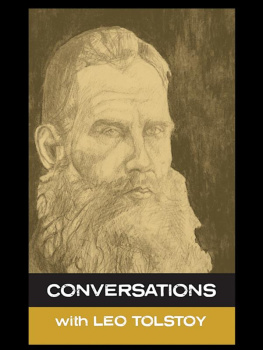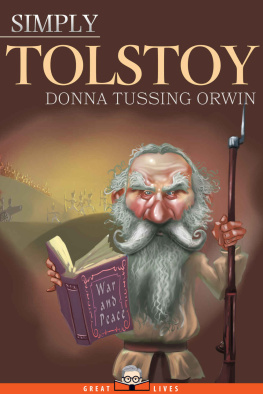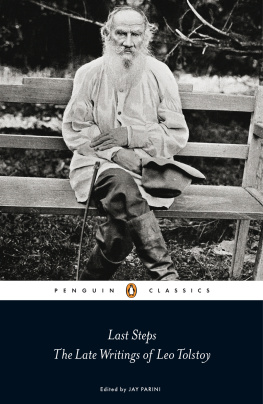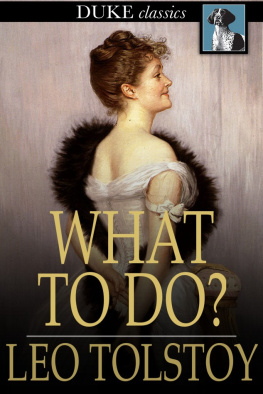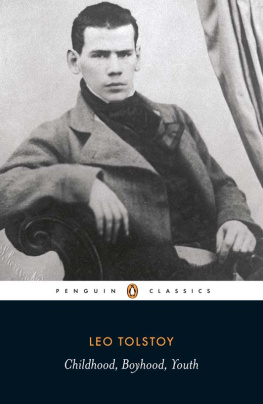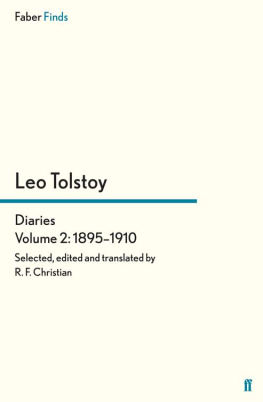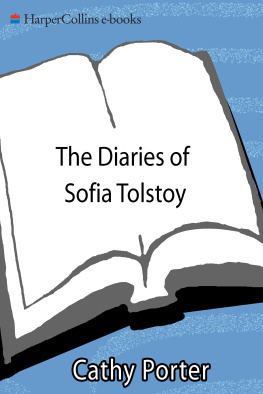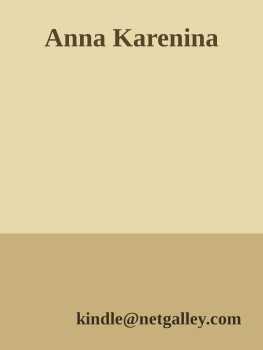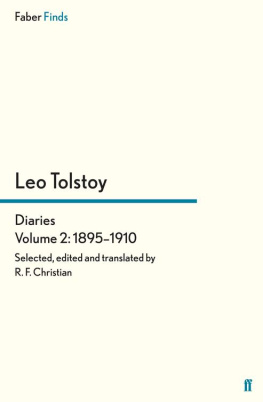TOLSTOY
The Making of a Novelist
EDWARD CRANKSHAW

Leo Nikolayevich Tolstoy was not content with being the greatest novelist in the world; he wanted much more to be a great philosopher and teacher. This was a peculiar ambition in a man of powerful intellect who for most of his life was so frightened of death that he could not think straight; who was, at the same time, so unrestrained in his pretensions that he angrily rejected the terms of life, which must end in death, and refused to submit to the framework that contains all philosophy and all human greatness of spirit. He was Lucifer in the magnitude of his presumption, pathetic in the twists and turns to which he was reduced in his vain flight from reality.
When he had recovered from the suicidal depression induced largely by the strain of producing his masterpieces, War and Peace and Anna Karenina, and, at fifty-one, composed the celebrated Confession, he presented himself as a changed man. In the course of that essay, describing the great change that had come over him, he said: My mental condition presented itself to me in this way: my life is a stupid and malicious joke which someone has played on me. Although I did not acknowledge a someone* who had created me, that formulationthat someone had played an evil and stupid joke on me by placing me in the worldwas the form of expression that came most naturally to me.
It was characteristic of him that this very usual and unoriginal sense of the futility of life had to be dramatized as a sudden revelation, although it had haunted him since adolescence. On another level, it was also characteristic that he should see the stupid joke as being perpetrated at his, Leo Tolstoys, personal expense. A little later, he went on to reflect that we are all in the same boat, invoking in witness Solomon (or whoever wrote the works attributed to him), Schopenhauer, Socrates, and Buddha; but the first formulation of the idea that obsessed him for the rest of his long lifeand I think it may justly be said, the formulation that came most naturally to himexpressed an immediate sense of personal outrage.
It was also characteristic of the impact of Tolstoys personality, backed by his authority as a novelist of immeasurable stature, that when in middle age he started preaching, when he button-holed the world, fixing it with the eye of an angry and contemptuous ancient mariner, so many ran to proclaim him as a great and revolutionary teacher. They did this although the best of his teaching, which he presented with the air of an Old Testament prophet, consisted largely of various elementary truths and half-truths believed in and lived by many of the finest spirits, including countless nameless ones, for two and a half millenniaand although he proved himself incapable of living his own ideas until his superb vitality had burned itself out and he was fit for nothing but to run away from everything and die at a wayside station on the Moscow-Kharkov railway.
His greatness lay elsewhere. Everybody knows about it. It blazes across a century of human suffering: a signal of hope, a fixed point of orientation, a monument to a man who refused to take any stock in what seems hope to most of us, a celebration of life by a man who turned his back on it. All done by art, that art which he said he despised. The man who bore the burden of this achievement was, as a human being, a failure, impossible to live with, horrible in many ways, absurd in others, magnificent in some. The radiance of his marvellous genius was the reflection of a light that was too strong for his own eyes to bear. He bellowed his pain aloud and tried to drag into it all who would listen, pointing away from his triumphs and into the pit.
Tolstoy was not a great man in the fullest, the roundest sense of the term; nobody will find comfort, encouragement, example, in his life seen as a whole. But he was a giant. Everything about him was excessive, his virtues no less than his failings. There can be no question of debunking Tolstoy: except as a thinker, he debunked himself. And side by side with so much nonsense written about his thinking, there has been a steady process of clarification, beginning with the Russians, Leo Shestov and Konstantin Leontiev, moving on through Maxim Gorky and B. Eykhenbaum, to the recent work of John Bayley and Elizabeth Gunn. But it seems to me that even these and other acute and perceptive critics (with the possible exception of cool, unblinking Shestov) have on occasion been half-hypnotized by the sheer size of the man and by the implacable resonance of that tremendous voice into accepting too much at its face value, perhaps into beginning at the wrong end. How remarkable, they say in effect, that so great a man should have had such failings. The attitude is beautifully expressed in Isaiah Berlins Oedipus image, the closing words of The Hedgehog and the Fox: At once insanely proud and filled with self-hatred, omniscient and doubting everything, cold and violently passionate, contemptuous and self-abasing, tormented and detached, surrounded by an adoring family, by devoted followers, by the admiration of the entire civilised world, and yet wholly isolated, he is the most tragic of great writers, a desperate old man, beyond human aid, wandering self-blinded at Colonus.
But Tolstoy was not always an old man. He started War and Peace at thirty-five and finished it at forty. And although Anna Karenina still lay before him and he had another ten years to go before he achieved the final, painful, never complete transformation from artist into prophet, he had fulfilled his genius and deployed all those elements which went into the making of the bearded patriarch of the Tolstoy legend. It may help us, therefore, to a fuller understanding of his towering genius and the limitations that went with it if we tear our eyes away from the terrible gaze of the tortured and cruel old man whose story has been told so many times and try to see him as he was before he became a world figure: Count Leo Nikolayevich Tolstoy, born August 28, 1828, the fourth son of Count and Countess Tolstoy of Yasnaya Polyana in the district of Tula.
A Note on Translations
I have used Louise and Aylmer Maudes translation for War and Peace; Aylmer Maudes for Confession, Recollections, and Hadji Murad; Rosemary Edmonds new translations for Childhood and The Cossacks. All other quotations from the Russian, including passages from Anna Karenina and extracts from Tolstoys diary and letters, are in my own translation unless otherwise indicated in footnotes.
1
Family Happiness
The Russia into which Tolstoy was born in 1828 was very much the Russia he was to evoke nearly forty years later in War and Peace. Alexander I, the conqueror of Napoleon, had died less than three years before, and many of the men who had stood close to him now surrounded his younger brother, the new Emperor, Nicholas I. Thus, for example, when Tolstoy came to describe the would-be reforming minister, Mikhail Speransky, at the height of his early fame, he was writing about a man who was still alive and politically active in his own lifetime. Pushkin was twenty-nine, still unmarried, with nine more years to live; Eugene Onegin was published in its entirety when Tolstoy was three years old.
Such is the distancing quality of Tolstoys art, so far is 1812 from us, that it is hard to realize that War and Peace, though by all means a historical novel, dealt with history so recent that for many of its readers, as the first volumes came out in 1865, it was part of their own childhood memories. Some, indeed, had themselves fought at Borodino or lived through the burning of Moscow. Tolstoys own father had been taken prisoner by the French.


